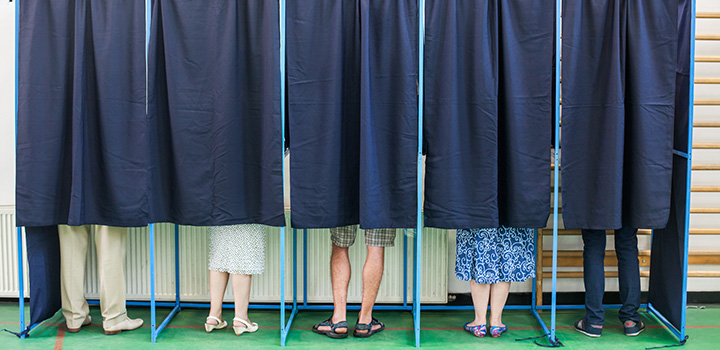Voter registration reforms needed for inclusive democracy, UEA researchers urge
By: News Archive

Electoral reform is urgently needed to rectify the millions of UK voters ‘missing’ from the register, according to a new report from researchers at the University of East Anglia (UEA).
Voter registration rates are declining, with an estimated 9 million eligible voters missing from the rolls. Moreover, citizens often mistakenly think they’re already registered.
The research-led report makes 28 recommendations to modernise the UK’s electoral machinery for a more inclusive 21st Century.
The report, ‘Is it time for Automatic Voter Registration (AVR) in the UK?’, is published today by the Joseph Rowntree Reform Trust. The authors are UEA’s Prof Toby James of the School of Politics, Philosophy, Language and Communication Studies, and Dr Paul Bernal, associate professor in the School of Law.
Prof James, a professor of politics and public policy, has done extensive research and consultation on electoral practices, recommendations and reforms across the world.
Prof James said: “Political equality is a founding principle of democracy and policies to make voting accessible are therefore needed to ensure a level playing field.
“Some form of automatic or assisted voter registration could boost voter registration rates amongst under-represented groups to create symmetry in the UK.”
In recent years, there have been calls for AVR from parliamentary committees, campaigners, politicians and academics. Cross-party support for AVR came from the Political and Constitutional Reform Committee in its 2014 report on ‘Voter Engagement’, and the All-Party Parliamentary Group on Democratic Participation’s report on the ‘Missing Millions’ in 2019.
AVR is a broad principle and umbrella term that could in practice involve a range of different approaches. The report defines AVR as ‘the direct enrolment of citizens onto the electoral register by public officials, without the need for pro-active action by citizens’.
AVR contrasts with the current system in the UK, in which citizens are responsible for registering themselves ahead of the deadline for election day. Each time an election approaches, electoral officials are put under severe pressure with last-minute applications close to deadline day.
Assisted Voter Registration could be introduced by prompting citizens to register to vote when accessing a range of other government services, such as applying for a driver’s licence. Using Freedom of Information requests, the UEA researchers estimated how many citizens could be prompted to register to vote through Assisted Voter Registration:
-
6.5 million per year could register when applying for a passport
-
4 million people could register when they update their drivers licence address with the DVLA
-
2 million a year could register when applying for Universal Credit
-
2.5 million students could be registered through annual student enrolment
-
800,000 could register when they apply for child benefit for the first time
-
700,000 could directly enrol at 16 years old, when being issued a National Insurance Number
-
500,000 could register when they provide the Student Loans Company with a new address
-
450,000 could register when they apply for disability benefits
The report also states that any move toward AVR would need to consider data concerns, such as the provision to register anonymously. This is vitally important for citizens such as domestic abuse victims. Anonymous registration should be expanded for a longer period and made easier for the citizen to administer, said Dr Bernal, an associate professor of IT, IP and media law.
Dr Bernal said: “There is currently an open/edited register that citizens can opt out of. This can be purchased by anyone. It is currently used by companies to construct people databases where you can search for an individual’s address, likely age, length of residency, other household occupants, previous household occupants and neighbour’s details.
“Concerns about the safety of voters is another reason why the open/edited register should be abolished.”
Prof James and Dr Bernal have also written a blog post outlining their findings, which will be published Wednesday on Democratic Audit.
‘Is it time for Automatic Voter Registration (AVR) in the UK?’, is published by the Joseph Rowntree Reform Trust published on Wednesday, April 29, 2020.
Prof Toby James is Professor of Politics and Public Policy at the University of East Anglia, UK. His most recent books are Comparative Electoral Management (Routledge, 2020) and Building Inclusive Elections (Routledge, 2020).
Paul Bernal is Associate Professor of IT, IP and Media Law at the University of East Anglia, UK. His most recent book is What do we know and what should we do about internet privacy (SAGE, 2020).
Related Articles

Nurses worldwide rely on intuition to triage patients
Nurses around the world use intuition to work out how sick a patient is before triaging for treatment according to new research from the University of East Anglia.
Read more
UEA nursing apprentice’s sky-high dive for Alzheimer's and Dementia awareness
On Sunday 24 September, University of East Anglia (UEA) nursing apprentice Francessca Turrell will be taking part in a charity skydive for Alzheimers Society, a UK care and research charity for people with dementia and their carers.
Read more
New book to focus on Norwich’s medieval logos
Logo Rewind: Trademarks of Medieval Norwich is a new book from UEA Publishing Project, in collaboration with CreativeUEA and featuring the work of Darren Leader, which will focus on the stories of Norwichs medieval merchants marks found in different locat
Read more